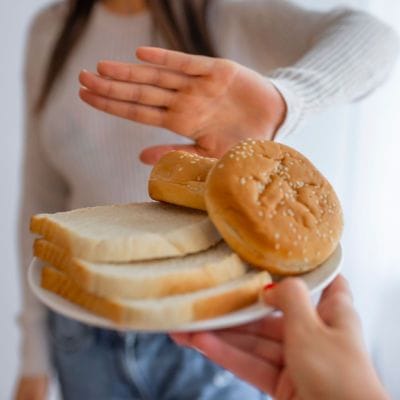 OVERVIEW
OVERVIEW
An autoimmune disorder, celiac disease (previously known as celiac sprue or gluten-sensitive enteropathy) is triggered by an abnormal immune response when you consume anything with gluten. Gluten is a protein found in wheat, rye, barley, and sometimes oats.
The resulting immune response causes your immune system to damage the lining of your small intestine, affecting your body's ability to absorb nutrients during the process of digestion.
Many foods contain gluten, including cereal, pizza, beer, bread, pastries, and pasta. People with celiac disease may get symptoms when they eat food that contains gluten, although not all patients will have symptoms. Signs and symptoms may include:
- Abdominal pain
- Loss of appetite
- Bloating
- Nausea
- Gas
- Constipation
- Diarrhea
- Anemia
- Bone and/or joint pain
- Fatigue
- Headache
- Foul-smelling stool
- Loss of weight
- Skin rashes
- Infertility
A board-certified gastroenterologist can help diagnose celiac disease. Adopting a strict gluten-free diet is the best way to treat celiac disease. A dietician may be able to help with this.
What Foods Can You Eat With Celiac Disease?
When grocery shopping, look for foods labeled gluten-free. Many restaurants also have gluten-free menus. In addition, the following foods are naturally gluten-free:
- Poultry and eggs
- Milk, cheese, and other dairy products
- Fish and seafood
- Beef
- Beans and legumes (if labeled gluten free)
- Fruits
- Nuts
- Vegetables
- Wine and distilled liquor
When it comes to grains, the following naturally gluten-free grains and foods exist and can be used to replace wheat, barley, oats, and rye in your diet:
- Arrowroot
- Amaranth
- Buckwheat
- Cassava
- Chia seeds
- Flax seeds
- Gluten-free oats
- Gluten-free pastas
- Millet
- Corn
- Potato
- Quinoa
- Rice
- Soybeans
- Sorghum
- Teff
- Tapioca
- Yucca
Foods to Avoid When You Have Celiac Disease
Avoiding foods that contain gluten may sound like a big ask, but today's innovations in food have made a lot of gluten-free counterparts available to consumers.
If you have celiac disease, here is a list of foods to avoid—they may contain gluten:
- Beer
- Bouillon cubes
- Certain sauces, spices, and salad dressing-read all labels
- Seasoned tortilla chips
- Imitation fish
- French fries
- Certain condiments- read all labels
- Cold cuts
- Candy
- Bread and pastries
- Cereal
- Crackers
- Food coloring
- Ramen noodles
- Pasta
- Soups
- Wheat, including semolina, spelt, farina, emmer, einkorn wheat, and durum
- Malt, including malt syrup, malt vinegar, malted barley flour
- Brewer's yeast
Gluten can be in products you least suspect, especially if they contain one of the following ingredients:
- Wheat starch
- Wheat bran
- Wheat germ
- Cracked wheat
- Hydrolyzed wheat protein
- Emulsifiers, like dextrin, mono- and di-glycerides
- Caramel colors
Disclaimer:
The information on this website is provided for educational and information purposes only and is not medical advice. Always consult with a licensed medical provider and follow their recommendations regardless of what you read on this website. If you think you are having a medical emergency, dial 911 or go to the nearest emergency room. Links to other third-party websites are provided for your convenience only. If you decide to access any of the third-party websites, you do so entirely at your own risk and subject to the terms of use for those websites. Neither FLINT GASTROENTEROLOGY ASSOCIATES, PC, nor any contributor to this website, makes any representation, express or implied, regarding the information provided on this website or any information you may access on a third-party website using a link. Use of this website does not establish a doctor-patient relationship. If you would like to request an appointment with a health care provider, please call our office at (810) 603-8415.

 OVERVIEW
OVERVIEW

